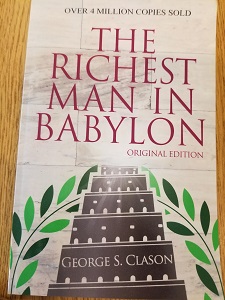
Photo credit: jb
This is the third in a series of articles reviewing the lessons found in the definitive classic, The Richest Man in Babylon by George S. Clason. If you’d like to start at the very beginning (a very good place to start!) – you can find the first article here.
Meet the Goddess of Good Luck
In this chapter, Arkad is asked by a student about how to attract good luck. It is noted that people may work side-by-side with one another, and one may have good luck while another does not.
The students are questioned about times when they had experienced good fortune to perhaps find out the way that good luck came upon them. One student found a wallet full of money – but could not reckon how to continue finding more wallets. Another noted that Arkad himself had been seen at the horse races, betting on the grays. Alas, Arkad pointed out that gaming houses and horse races, while frequent locales for witnessing the good fortune of a few, the odds are always in favor of the organizers (the house), and good luck does not flow to the game players very often.
Finally, a livestock trader speaks up about a time when he allowed good fortune to slip through his hands. It seems that he had an opportunity to purchase a flock late one night, when the owner of the flock was anxious to complete the sale and return to his home. By delaying the purchase until morning, more buyers were on the scene who were willing to pay a much higher price than was originally offered, and so the good fortune slipped by. By procrastinating his decision, the buyer lost out on a fine profit.
At this, another fellow, a trader, pointed out that he had been subjected to his own procrastination early in his career. By finally recognizing it and working against the urge to delay, he was able to cause much good fortune to come his way. By taking action, even in small ways, toward making a decision, the trader accounted that his fortunes had changed to the better.
We see these kinds of situations in our lives all the time. Maybe there’s a good opportunity to invest in a valuable piece of real estate at a reasonable price, or to buy stock when the overall market is relatively low-priced. Unless we recognize these situations and take action, even a small action, we are driving away the “good luck” that action brings to us.
This is not to say that we should fall for every pitch that comes to us. We should evaluate each opportunity closely, and take action one way or another as we see fit, especially when we seem to vascillate. As Arkad points out, too often we are dead sure about our wrong decisions and tend to procrastinate about the right ones. Over time you gradually begin to recognize these faults and overcome them. Doing so brings “luck” in the form of opportunities taken advantage of as they are presented.
Lesson: A person of action is favored by the goddess of good luck. Procrastination upon decision-making only leads to regrets. Make decisions with all the good information that you have – either for or against an action – and carry out the decision. Indecisiveness does not bring good fortune.
The next part of this review is “The Five Laws of Gold“.